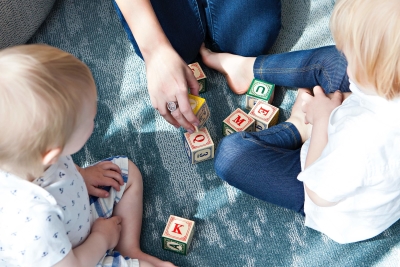
Smartphone Use and its Impact on Your Child’s Health
It’s important to be aware of the consequences of too much smartphone use. While there are times where smartphone access is appropriate, when your child overuses mobile devices, it can have a significant impact on their mental and physical wellbeing.
Studies show some of the harmful effects prolonged viewing of online content can cause:
Weight problems
Excessive smartphone and mobile device use during preschool years has been linked to a small, but significant, increase in body mass index (BMI). A recent study of 2-year-olds found that BMI increased for every hour per week of media consumed.
To avoid an increased risk of weight problems in your child, make sure that they’re getting at least one hour of exercise a day and limit the amount of smartphone use accordingly.
A toddler sleeping
Sleep
Other problems tied to smartphones and screen-time is increased media exposure and the presence of a mobile device, computer, or television in the bedroom. Screen use in the evening has been associated with fewer minutes of sleep per night.
Sleep deprivation can have serious consequences on your child’s health so encourage good sleeping habits. Enact a “no screens in the bedroom rule” and avoid screen exposure one hour before bed, even for reading bedtime stories.
Children and teens need 9-12 hours of sleep a night, with at least 20 percent of that being deep sleep. This is the time that the body recovers most. Studies have shown using a smartphone or tablet before going to bed disrupts sleep cycles, having an even greater impact on the sleep cycles of children.
If your child spends time on a smartphone or staring at other screens in the evening before bed, their sleep can be disrupted, leading to mental health issues.
Tech neck and texting thumb
Hand muscle injuries are becoming more common due to repetitive motions of gripping, tapping and swiping. Smartphone overuse can cause wrist pain because the tendons that connect to the thumb can become inflamed at the wrist. Your elbow can also be affected if frequently bent holding a phone.
Pay attention if your child begins massaging their hands after they use their mobile device or if they begin to complain about pain in their elbows. If this starts to happen, ask them to take a break from playing games and messaging so that the issues don’t become more severe.
Bending your head to look at your mobile device when held in your hands puts additional pressure on your neck. It can bring about chronic pain and cause poor posture.
Paying close attention to your child’s posture while looking at their phone is necessary to prevent injury. If you see them straining their necks, ask them to hold their phone at an angle so they can keep their head and neck straighter and their eyes turned down towards the screen.
When using a tablet, have them sit at the table and prop the tablet up so they can interact with it without looking like they’re folding in half.
Little girl sitting on a knee using a laptop
Eye strain
Health officials have expressed new concerns about the overuse of smartphones by children and teens, and the effect it has on their eyesight.
During their childhood and teenage years, a child’s eyes are still developing. It has been found that prolonged use of smaller screens, like those on tablets and smartphones, can cause digital eye strain which includes blurry vision, difficulty focusing, dry and irritated eyes or headaches. A recent increase of nearsightedness in children has been attributed to too much screen-time.
Not much can be done to avoid this besides being diligent about keeping gaming and messaging sessions short. Take your child to an eye exam if they begin to complain about frequent headaches.
. . .
It may seem impossible to limit your child’s smartphone use through all the whining you get when you tell them screen-time is up, but you can teach them by example. If your child sees you glued to a smartphone, you may have a hard time convincing them it’s for their own good. Do your best to follow the same screen time rules you set for your child.
The best way to get through the hysteria is by knowing that, although they might see it as otherwise, what you’re doing for your child will greatly benefit them and their future.
Where to go from here
The purpose of this growing collection of articles is to examine the benefits and the dangers of the internet, as well as the effects it may have on your child’s mind and their daily life. Consult these articles for advice on how to help your child stay safe and healthy in a digital world.
Is there anything you’d like to add, have we missed anything? If you’re interested in sharing your experiences with us or writing a guest post for us, send us an email via hello@mudita.com!
Please feel free to get in touch via social media (send us some photos or videos too), you can find us on Facebook, Twitter and Instagram, let’s connect! To learn more about Mudita, take a look at our website and our other posts.
If you enjoyed reading this article, please share and recommend it!
Related stories

Help your Kids Maintain a Sleep Schedule During Winter Break
Discover tips for maintaining your child's sleep schedule during winter break & embrace holiday harmony with Mudita's guide to healthy sleep habits.

How Screen Time Could Harm Your Preschooler's Development
Discover what modern technology means for the future of our children. Explore the impact of mobile devices on preschoolers' development in this revealing study

4 Skills to Teach Your Child in the Digital Age
It’s hard to predict how the education system and workforce will look in the next ten years. All this uncertainty may be worrisome to a parent.
If you'd like to receive the best stories from our blog, keep up to date with our progress and get notified about our product releases and special discounts.